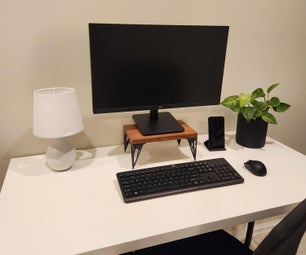Introduction: IoT-Arduino Project
This is a remote interactive device. Two people each own a device. When your device senses your presence, the other party's device will light up. In this way we want people to connect with each other.
Supplies
Two ESP8266/two infrared detector/two red LEDs/two yellow LEDs/some resistors/some wires/some fabrics
Step 1: Make Some Sketches
I hope it is a desktop component. It's best only the size of a milk carton. Use the power cord to supply power and be able to connect to the Internet.ght up. In this way we want people to connect with each other. Here are some design sketches.
Step 2: Build the Circuit
I‘m using the ESP8266 NODEMCU board. So the circuit can be built in this way.
The black sensor in the circuit is GP2Y0A02YK0F20 Infrared distance sensor.
Step 3: Use Adafruit.io
Use adafruit.io to get an online information transportation. That's how the two devices talking to each other.
Create two new feed command1 and command2.
Find your IO_KEY information in My Keys.
Step 4: Write the Program
Algorithms are attached under. There's three parts that you have to write by yourself.
The first one is the IO_USERNAME and IO_KEY. Use the username and key we got from previous step.
The second is your WIFI name and WIFI passport.
The last one is the sensitive range of your sensor. It's in the loop. Change the number(in picture is 400) after the word "if value" to have the sensitive ranhe you would like to have.
Upload these two programs to two ESP8266 boards.
Also make sure you have these libraries in your Arduino.
Step 5: Assemble Parts
Use a breadboard to test the components. The first test is the detector. Use the serial monitor to determine whether the detector can work normally, and what its sensing value is (my feedback number is about 400)
Make sure you have these SYB-170 micro breadboard(35mmx47mm). Or other size might not fit into the model later.
Step 6: Quick Check
Before final assembly, we must ensure that all components can run smoothly.
Step 7: 3D Printed Shell
Use rhino to make a 3D printed shell. All dimensions fit the device just right. The two stl files of parts are attached.
Use a white ping-pong ball as it's head.
Also you can use whatever you like:)
Step 8: Final Assembly and Effect
This is the final video, including the assembly process.












